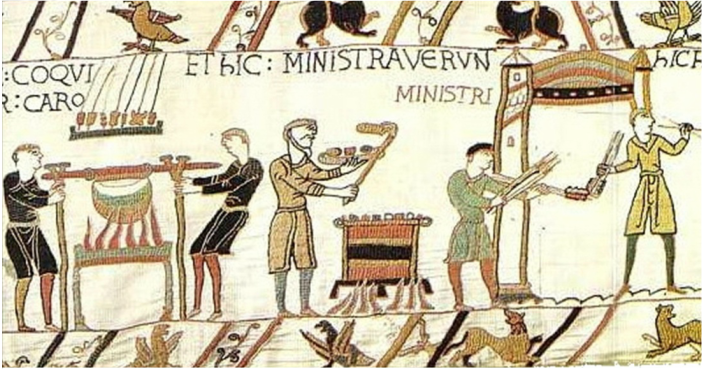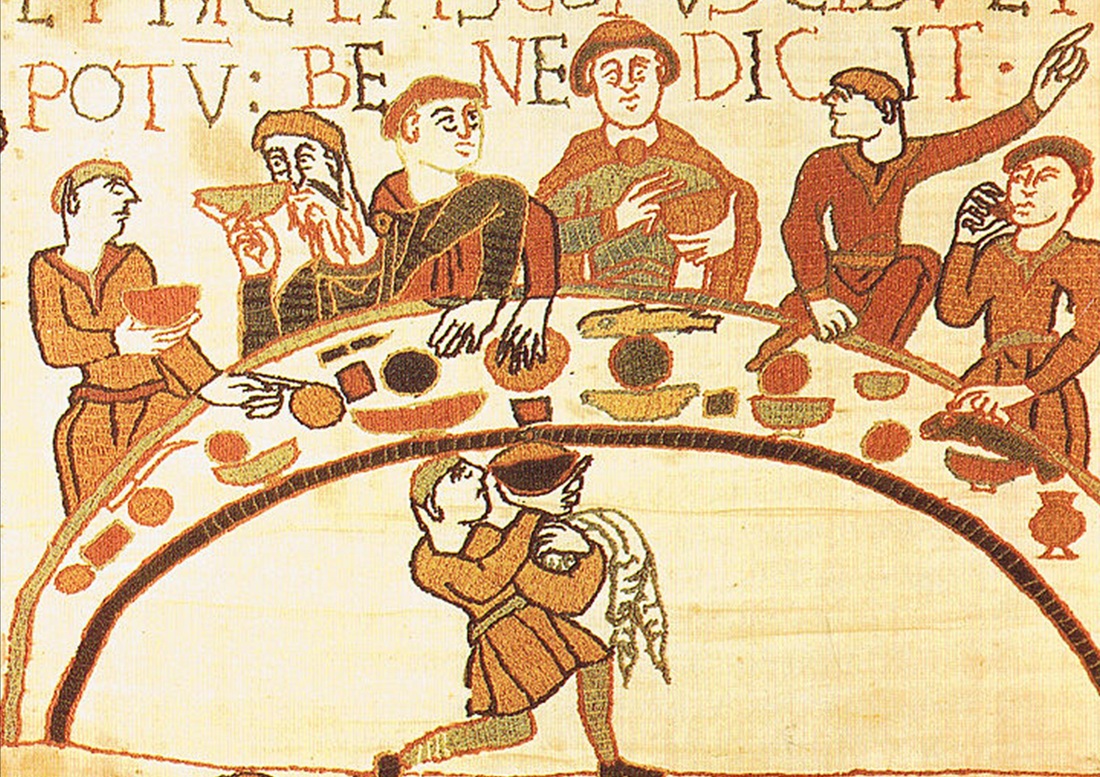Whilst you all face the traumatic Christmas quandary of whether or not to break with the traditional turkey and finally try goose this year, the Anglo-Saxon Monk continues his lonely struggles with Christmas fasting. Have a little compassion, please! Well, what a blessed kerfuffle! This fasting business for Yule-tide Lent – the forty days before Christmas – is proving to be rather problematic, as you already know if you were one of the compassionate readers of my previous post.
OK, I only have myself to blame. Trying to get back on track with my fasting seemed such an honourable endeavour, but I’m beginning to have qualms about my methods. As I informed my blessed readers, I’m attempting to find a greater purpose, or motivation, for fasting. I don’t know why, but the fact that fasting should allow me to devote myself more fully to my spiritual duties just isn’t cutting the mustard (and German sausage). It’s been suggested to me that attempting to draw inner strength by imagining the sin of vomiting due to gluttony and drunkenness – which attracts 7 days of fasting as penance – was, quite frankly, ridiculous logic. But that’s what absence of food does to you. It addles your brain. And mine, I can tell you, has been just like scrambled eggs these last couple of days. (I like them softly scrambled, by the way, with no stinting on the butter, and well seasoned.) So, I’ve moved direction with my sinning – my imagining of it, that is. And here’s what I’ve come up with through my careful reading of my scriftboc, my handbook of penance: ‘If a little boy steals or eats carrion, and he understands this, he should fast seven days. If he’s twenty winters old and does such a thing, he should fast twenty nights.’ (Scriftboc, my own translation) So, as you see, for this sin I need to imagine myself as a little boy, probably some ruffian or village urchin. Any older, and I would have to fast for another twenty days, and I don’t have enough days left before Yule to do that. Now, I know you’re thinking that this is another case of me falling to another eating-related sin, but please take note: I am just imagining stealing the carrion, not eating it! And what would I want anyway with mangled, putrescent carcasses when some nice cheese, a few softly boiled eggs, a hunk of roast lamb and a flagon of mead is to be had – in my imagination, I mean?! Oh, this is no good! I have to get my thoughts away from food! But what is a poor, fasting Anglo-Saxon monk to do? There’s only one thing for it. No more food-related sins. Instead, I must think about ... sex. The trouble is, will I be able to find a sexual sin in my scriftboc that attracts less than a year’s fasting? Well, it would be most educational to find out ...
0 Comments
Never mind those advent chocolates, or that mulled wine and German sausage at the Christmas market! We good Anglo-Saxons are expected to fast before Christmas - forty days, I'll have you know! Two weeks to go until Geol! That’s ‘Yule’ or Christmas to you, my blessed readers. (Old English Geol, by the way, is pronounced quite similarly to ‘Yule’, that is, with a soft ‘g’).
Alas! I’m failing miserably in my preparations. You see, I’m supposed to be fasting the forty days before Christmas, so that I can concentrate on reading prayers for everyone. Well, I’m doing pretty well with the latter, well at least when I can keep my mind off food! But having to stave off the hunger until nones (the ninth hour, or 3 p.m. in your world) is, I fear, just too much for me. And I’d promised so faithfully – vowed, in fact – that I would lose a few pundas (that’s ‘pounds’ to you, no funny kilo stuff in my world) before the inevitable onslaught of festivities and feasting. You understand my logic: I’m getting a bit porky around my middle so I need to anticipate my Christmas gluttony; lose the weight beforehand, in order that I won’t feel the need to confess in the New Year once I’ve piled on the fat. I’m nothing if not imaginative. Now, I’ve been wondering all day if I should try to get back on track somehow. Then I realised I needed a greater motivation for fasting, a stronger reason, something more than the fact that fasting gives me more time to pray for you all. So I’ve just been poring over my penitential (penance book) to see what sins would attract two weeks of fasting. I’m not saying I’m going to commit the sins, I just want to imagine that I’ve committed them. That way, then, I will feel more obligated than at present to complete the remainder of my fasting period. You understand, I know you do. So over the next few days I will let all my blessed readers know what I come up with: that is, what sin(s) = 14 days fasting. I’m feeling better motivated already. Here’s my first sin; well, looks like I’m going to have to imagine doing it twice: ‘If he vomits because of drunkenness or gluttony or illness, he is to fast 7 days or is to sing two psalters’. (Scriftboc: translation by Allen J. Frantzen) Seems straight forward enough. The only caveat is that I mustn’t ‘throw up the host’ (that’s the holy bread at Mass), otherwise I get 40 days. Well, I could never imagine doing that! The Anglo-Saxon Monk writes a piece for the official website of the BBC History Magazine. Click here. Yesterday evening I received a message via Twitter from a lovely fella who always reads and comments on my meagre musings. He goes by the name of @Huscarl1066. In his DM, he said he wasn’t ignoring my recent posts, but that he didn’t feel up to tweeting at the moment, for his gorgeous wife had just passed away. What can one say? Words sometimes seem so useless, don’t they? Nevertheless, they're sometimes all we have. So I hope that, here, some words of another husband may prove beneficial, perhaps of some comfort, sometime in the days to come for @Huscarl1066. I know he loves the history of the Anglo-Saxon era, so here I leave him some words, like a message-bearer, from one of the period’s loveliest poems. The Husband’s Message is a poem about an exiled man who has been separated from his beloved wife, his dearest friend. Though he now is a wealthy man in the land to which he was exiled, none of his wealth compares to the desire he has to be reunited with his beloved. The narrator of the poem is the husband’s message bearer, and so we hear the words he speaks to the wife. I have adapted the translation by S. A. J. Bradley.
|
Details
|









